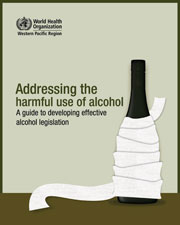
Men drink, women suffer - also in Malawi
”When he’s drunk, he becomes mad, he talks at the top of his voice, he beats me and he eats all the relish in the pot, which is not good. I am like a slave to him. I am not happy at all. I don’t enjoy marriage because we have no food, he spends his money on drinking and he comes home late’.
This quote from a 25 year old woman in Malawi’s capital Lilongwe is one of the many thought provoking statements in two new research reports on alcohol and drug related problems in Malawi. “Had it been that he doesn’t drink we could have always have enough food”, another woman said to the research team behind the reports.
The reports can be downloaded here:
Substance Use and Abuse and its Implications in a Malawian Context (SINTEF report March 2008)
Substance Use and Gender Based Violence in a Malawian Context (SINTEF Report March 2008)

The new documentation on substance abuse in Malawi is produced by the Centre for Social Research in Zomba, Malawi and the Norwegian research institute SINTEF Health. The purpose of the study, which has been commissioned by FORUT Norway, has been to get a better understanding of how local communities, and women in particular experience, alcohol and drugs problems. The material is a qualitative study, with comprehensive interviews of 36 informants, men and women, in a rural and an urban area.
NGOs welcome the new material
At the launch of the reports in Lilongwe (picture below), more than 30 invited organizations and experts met to discuss how the new material could be used for prevention of both gender based violence and alcohol problems in Malawi. The general sentiment was that the research reports document a problem that is well known by organization working with gender issues in Malawi. The meeting called for a broader survey to be done, where the extent of the problem of alcohol and gender based violence could be explored, in addition to the now available material on the character of the problem. The NGO Gender Coordination Network was asked to take the lead in a process to create public awareness on the relations between drinking and gender based violence.

The dominant feature in the new material from Malawi is well known in all parts of the world: Men drink alcohol, women suffer. The reports also confirm the global trend that alcohol-related harm is a much larger problem than drug abuse. Knowing that drunken behaviour is closely connected to violence, family problems and risky sexual behaviour, the two researchers also recommend more studies to explore the relationship between substance use and poverty and substance use and HIV/AIDS.
At the launch of the new material in Lilongwe, Stine Hellum Braathen (picture below right) from SINTEF Health reported that seven of the 12 married women who were interviewed in this study had experienced being raped (forced to have sex) by their husbands. 11 of the 12 knew of other women who had been sexually abused by their husbands or other men who had been drinking alcohol or smoking chamba. She also referred to previous studies from Malawi where close to 50 % of the female informants had experienced some form of intimate partner violence or abuse. Women whose husbands consume alcohol frequently, are much more likely to report violence than women whose husbands do not drink.

The story of Chimwemwe
The stories of the female informants in the SINTEF study are thought provoking indeed, like the story of Chimwemwe (not her real name). Chimemwe says that her husband is a very jealous man, and he drinks alcohol every day. When he drinks he almost always beats her; 'A week cannot pass without beating me'. He spends much of the family's income on alcohol, money Chimwemwe feels could be used on much more useful things. Every night Moses comes home drunk, and he urinates and vomits in the bed, and when she tells him to go outside he beats her. He also beats her if she is not wearing a chitenje (sarong), and when her four year old daughter sees her without the chitenje she says, 'Mommy, dad will beat you because he wants you to wear chitenje always.’ Chimemwe does not like to sleep with her husband when he is drunk, because he stinks, he behaves badly, and she is afraid that he has been cheating on her with other women who may be HIV positive. If she refuses to have sex with him, he forces her. She often talks to other women in the township who also have husbands who drink all the time. There are many of these women where she lives, and the women share many of the same experiences. Chimwemwe says that; 'We women are so vulnerable because whenever they (the men) are drunk they beat us and they insult, which is not good. We want to be loved.'
The sufferings of women are confirmed by male informants in the study. A 24 old man from Chembe admits that he spends a lot of money buying beers. ‘(…) and you can not prosper with beer. A lot of people have become useless in the community because of drinking beer. They make a lot of money today, they go drinking and all the money is being used up at the pub leaving wife and children suffering.’ Another man from Chembe said that ‘The bad side of beer is that it affects people who are not drinking with you; like the wife is not happy to see her husband drunk. This brings poverty in the house.’
A vicious circle
At the seminar in Lilongwe Stine Hellum Braathen from SINTEF said that several of the women inteviwed had reported being in a vicious circle: ”Men, when they drink, get very hungry, and when they come home they want to have food on the table, but often there is no food, because they have spent all the money on alcohol that should have been spent on food. This leads to a great deal of anger and frustration in the drunken man, and he often ends up shouting at his wife, or even worse; beating her.”
Furthermore, many of the women interviewed in the study reported that they struggle with husbands who become violent and irrational when they drink and/or smoke chamba. The women are loyal to their husbands and do their best to be good wives and in that way discourage their husbands from drinking/smoking and being unfaithful, irrational and violent. For example one woman in Lilongwe said that she often discusses with her friends how they can be good wives. She said that, ‘We teach each other how to cook delicious meals for our husbands so we can attract them with food and not going out for drinking.’
![]()
![]()
Developed with CustomPublish CMS by Nettinfo AS


